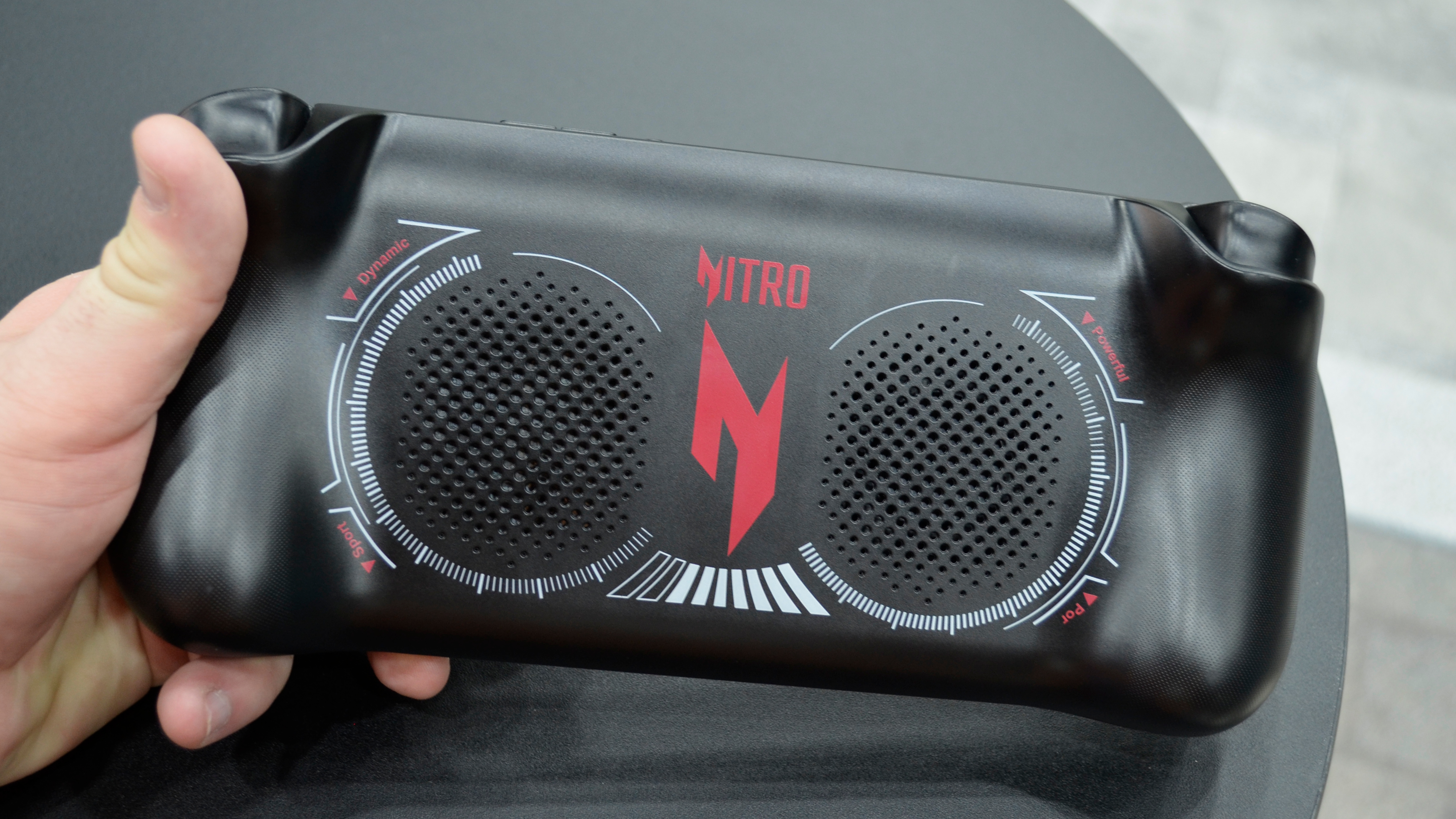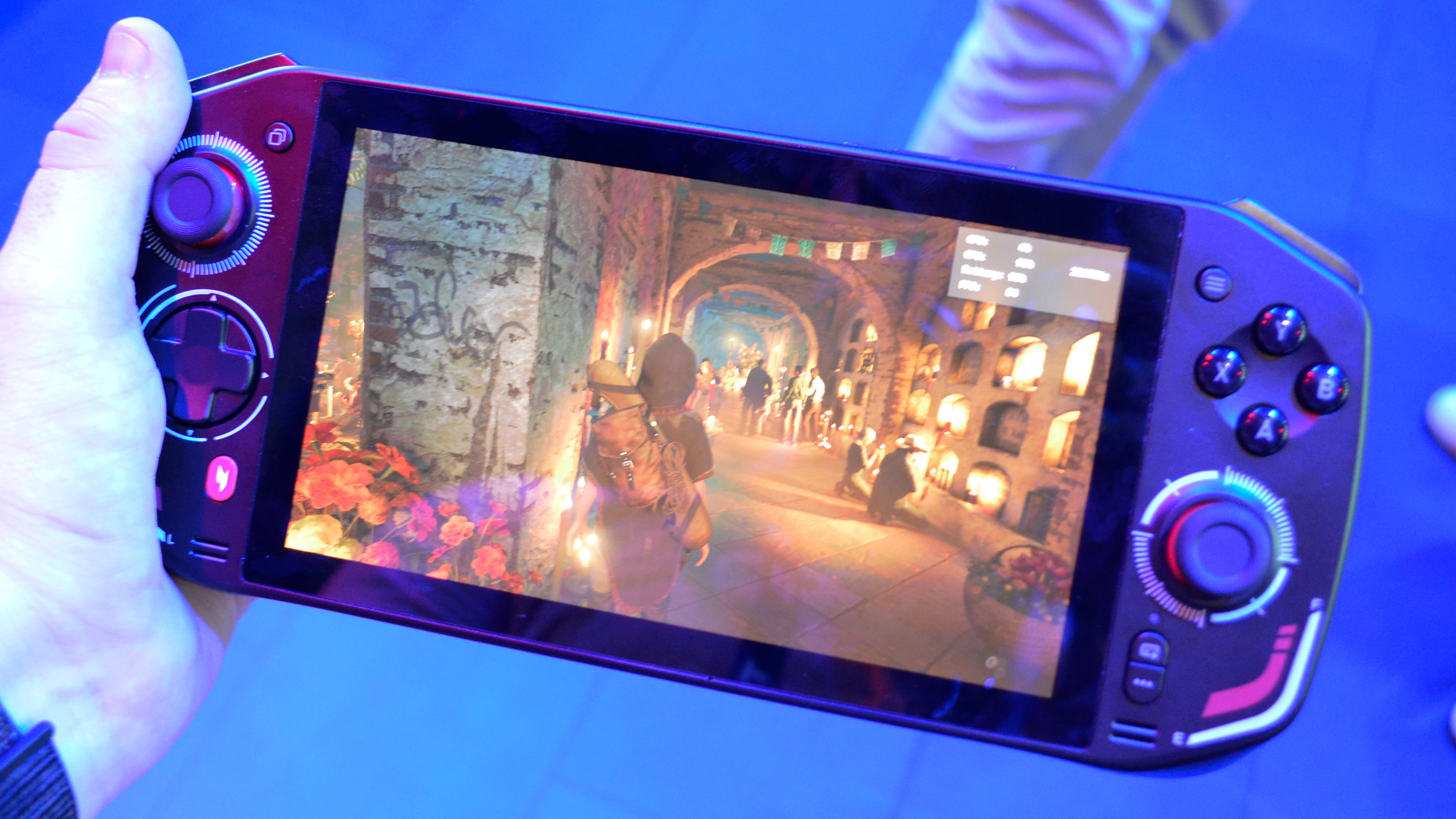We’ve got another PC gaming handheld on the market to take on the venerable Steam Deck: the Acer Nitro Blaze 7, and it looks like it might be a very strong contender against the current handheld champ, the Asus ROG Ally X.
The Blaze 7’s specs are pretty solid. In terms of hardware, it is sandwiched below the ROG Ally X but definitely above the ROG Ally, Lenovo Legion Go, and well above what the Steam Deck can offer.
This includes a 7-inch 1080p IPS touchscreen with a variable refresh rate up to 144Hz, up to 2TB PCIe SSD storage, and 16GB LPDDR5x memory running at 7500MT/s.
The real star here, though, is the AMD Ryzen 7 8840HS SoC powering the whole thing. This is a slight step up from the AMD Ryzen Z1 Extreme SoC found in the ROG Ally, Legion Go, and ROG Ally X, though only really in terms of its AI performance.
While the core counts in the CPU and GPU are the same, as are their speeds, you do get a dedicated NPU in the Ryzen 7 8840HS that should help offload some AI tasks. How much this helps with AMD Radeon Super Resolution (AMD’s hardware-based upscaler) remains to be seen, though.
Acer Nitro Blaze 7: Design
Table of Contents
Design-wise, if one thing is immediately noticeable about the Blaze 7, it’s that it feels a bit bulkier than the recently released ROG Ally X. However, it is nearly identical in terms of dimensions and is even a little bit lighter. Part of that comes from the ridged hand grips on the back of sides of the device, which felt a bit deeper than on other handhelds I’ve used recently. The spec sheet on the Blaze 7 isn’t exactly clear on whether that difference is real or just my imagination.
The chassis is black plastic with white and red accents around the device, something I haven’t seen on other devices. If nothing else, people around you will know you’re playing on a Blaze 7 rather than some other gaming handheld.

Regarding ports, you get a lot here, including two USB4 ports, one on the top and one on the bottom, which will definitely make this thing easier to dock. Furthermore, since the bottom port is Thunderbolt 4, it will support video output and power delivery.
The battery, meanwhile, is a substantial 50WHr, meaning you should be able to get solid gaming time in before you need to plug it in.
One noticeable component that is missing is any of the back macro buttons you get on the ROG Ally. Personally, I never use those on the ROG Ally X unless my ADHD-addled brain gets fidgity, as even a video game beamed right at my face from my hands isn’t enough to keep the restlessness away.
The rest of the buttons are the standard dual-stick, control pad, and ABXY buttons, as well as two triggers and two bumpers along the top of the device. You also get a power button with a built-in fingerprint reader, volume buttons, a view button, a menu button, a dedicated Acer Game Space button, a mode switch button, an Acer quick menu button, and (my favorite) a pop-up keyboard button.
Acer Game Space, meanwhile, is an all-in-one solution for managing your game library across different apps and storefronts that works reasonably well. It does remind you, though, just how terrible Windows 11 is as a platform for these kinds of handhelds.
Also of note is the heat vent along the top of the device. While playing Shadow of the Tomb Raider on the Blaze 7, that area of the device did get noticeably hot. This isn’t unexpected — after all, energy = heat — and it wasn’t something I noticed when holding the device as intended. I only felt the heat when my hand accidentally touched the vent (and the heatsink fins therein), so just something to keep in mind.
Acer Nitro Blaze 7: Performance

So I didn’t get to run any benchmarks on the device, unfortunately, but Acer did conveniently have Shadow of the Tomb Raider running on the device I got some time with, and they enabled AMD’s framerate tool to show the FPS on the device as you played it.
There were a couple of stutters here and there, but nothing you wouldn’t get on any other device like this. On the whole, though, the Blaze 7 consistently got around or above 60FPS at 1080p with medium settings with FSR tuned to performance mode.
On a seven-inch screen, these settings looked fantastic, and the frame rate was very consistent unless you walked around an area with very complex geometry (and not really the temples so much, as you’d think, but more the people in the village seemed to be the worst offender).
We’ll have to do a lot more testing to see how the device fares against the competition, but in my time with it, the Acer Nitro Blaze 7 looks like a very solid performer vis a vis its competition.
Acer Nitro Blaze 7: Price & availability
Unfortunately, we know nothing about the price or release date of the Nitro Blaze 7 at this time, though pricing and availability will surely be coming in the next few weeks.
That said, we can definitely expect it to be cheaper than the ROG Ally X since that handheld has 8GB more RAM than the Nitro Blaze 7, and memory right now is very expensive. Since the ROG Ally X sells for $799.99 / £799 / AU$1,599, the Nitro Blaze 7 needs to come in well below that to be competitive, so somewhere around $700 / £700 / AU$1450.
Any higher than that, and you’re better off getting the ROG Ally X for the extra RAM.
Acer Nitro Blaze 7: Final thoughts
From what I’ve seen, the Acer Nitro Blaze 7 doesn’t do anything especially well. It looks to be a fairly competent gaming handheld when it eventually goes on sale, but it’s not without its charms.
I won’t lie; the built-in keyboard button is something every handheld needs. Games that require keyboard input for names and other information really don’t handle a virtual keyboard well and often never give you the option to use one. You’re forced to try to escape to the desktop to bring in a keyboard from there, which can be a huge hassle in the middle of gaming.
The Ryzen 7 8840HS processor is also a solid improvement since it will bring some NPU power to bear, and hopefully, AMD RSR and other AI functions can properly leverage it.
All that is still an open question though, but I am excited to see what the Acer Nitro Blaze 7 can really do once we get a unit in for a more proper review.

























